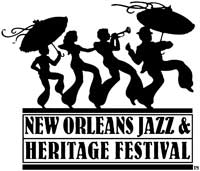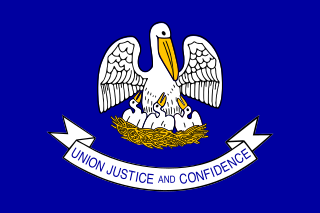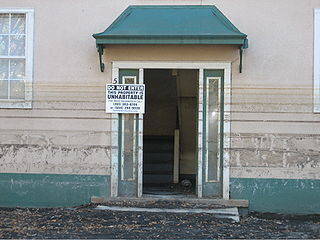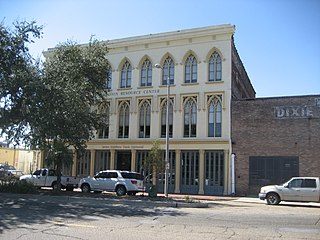
New Orleans is a consolidated city-parish located along the Mississippi River in the southeastern region of the U.S. state of Louisiana. With a population of 383,997 according to the 2020 U.S. census, it is the most populous city in Louisiana, third most populous city in the Deep South, and the twelfth-most populous city in the southeastern United States. Serving as a major port, New Orleans is considered an economic and commercial hub for the broader Gulf Coast region of the United States. New Orleans is also a region of French Louisiana, along with the Cajun Country.

Jefferson Parish is a parish in the U.S. state of Louisiana. As of the 2020 census, the population was 440,781. Its parish seat is Gretna, its largest community is Metairie, and its largest incorporated city is Kenner. Jefferson Parish is included in the Greater New Orleans area.

Habitat for Humanity International (HFHI), generally referred to as Habitat for Humanity or Habitat, is a US non-governmental, and nonprofit organization which was founded in 1976 by couple Millard and Linda Fuller. Habitat for Humanity is a Christian organization. The international operational headquarters are located in Americus, Georgia, United States, with the administrative headquarters located in Atlanta. As of 2020, Habitat for Humanity operates in more than 70 countries.

The New Orleans Jazz & Heritage Festival is an annual celebration of local music and culture held at the Fair Grounds Race Course in New Orleans, Louisiana. Jazz Fest attracts thousands of visitors to New Orleans each year. The New Orleans Jazz & Heritage Festival and Foundation Inc., as it is officially named, was established in 1970 as a 501(c)(3) nonprofit organization (NPO). The Foundation is the original organizer of the New Orleans Jazz & Heritage Festival presented by Shell Oil Company, a corporate financial sponsor. The Foundation was established primarily to redistribute the funds generated by Jazz Fest into the local community. As an NPO, their mission further states that the Foundation "promotes, preserves, perpetuates and encourages the music, culture and heritage of communities in Louisiana through festivals, programs and other cultural, educational, civic and economic activities". The founders of the organization included pianist and promoter George Wein, producer Quint Davis and the late Allison Miner.

Hurricane Katrina was a devastating Category 5 Atlantic hurricane that resulted in 1,392 fatalities and caused damage estimated between $97.4 billion to $145.5 billion in late August 2005, particularly in the city of New Orleans and its surrounding areas. At the time, it was the costliest tropical cyclone on record, tied now with Hurricane Harvey of 2017. Katrina was the twelfth tropical cyclone, the fifth hurricane, and the third major hurricane of the 2005 Atlantic hurricane season. It was also the fourth-most intense Atlantic hurricane on record that made landfall in the contiguous United States by barometric pressure.

As the center of Hurricane Katrina passed southeast of New Orleans on August 29, 2005, winds downtown were in the Category 1 range with frequent intense gusts. The storm surge caused approximately 23 breaches in the drainage canal and navigational canal levees and flood walls. As mandated in the Flood Control Act of 1965, responsibility for the design and construction of the city's levees belongs to the United States Army Corps of Engineers and responsibility for their maintenance belongs to the Orleans Levee Board. The failures of levees and flood walls during Katrina are considered by experts to be the worst engineering disaster in the history of the United States. By August 31, 2005, 80% of New Orleans was flooded, with some parts under 15 feet (4.6 m) of water. The famous French Quarter and Garden District escaped flooding because those areas are above sea level. The major breaches included the 17th Street Canal levee, the Industrial Canal levee, and the London Avenue Canal flood wall. These breaches caused the majority of the flooding, according to a June 2007 report by the American Society of Civil Engineers. The flood disaster halted oil production and refining which increased oil prices worldwide.

Hurricane preparedness in New Orleans has been an issue since the city's early settlement because of its location.

Criticism of the government response to Hurricane Katrina was a major political dispute in the United States in 2005 that consisted primarily of condemnations of mismanagement and lack of preparation in the relief effort in response to Hurricane Katrina and its aftermath. Specifically, there was a delayed response to the flooding of New Orleans, Louisiana.
Hurricane Katrina had many social effects, due the significant loss and disruption of lives it caused. The number of fatalities, direct and indirect, related to Katrina is 1,833 and over 400,000 people were left homeless. The hurricane left hundreds of thousands of people without access to their homes or jobs, it separated people from relatives, and caused both physical and mental distress on those who suffered through the storm and its aftermath, such as Post-traumatic stress disorder (PTSD).

The reconstruction of New Orleans refers to the rebuilding process endured by the city of New Orleans after Hurricane Katrina destroyed much of the city on August 29, 2005. The storm caused levees to fail, releasing tens of billions of gallons of water. The levee failure contributed to extensive flooding in the New Orleans area and surrounding parishes. About 80% of all structures in Orleans Parish sustained water damage. Over 204,000 homes were damaged or destroyed, and more than 800,000 citizens displaced—the greatest displacement in the United States since the Dust Bowl of the 1930s. Wind damage was less severe than predicted. The damage that took place that needed to be repaired cost about $125 billion.

Cyclone mitigation encompasses the actions and planning taken before a tropical cyclone strikes to mitigate damage and injury from the storm. Knowledge of tropical cyclone impacts on an area help plan for future possibilities. Preparedness may involve preparations made by individuals as well as centralized efforts by governments or other organizations. Tracking storms during the tropical cyclone season helps individuals know current threats. Regional Specialized Meteorological Centers and Tropical Cyclone Warning Centers provide current information and forecasts to help individuals make the best decision possible.

The Common Ground Collective is a decentralized network of non-profit organizations offering support to the residents of New Orleans. It was formed in the fall of 2005 in the Algiers neighborhood of the city in the days after Hurricane Katrina resulted in widespread flooding, damage and deaths throughout the city.

Musicians' Village is a neighborhood located in the Upper Ninth Ward in New Orleans, Louisiana. Musicians Harry Connick, Jr. and Branford Marsalis teamed up with Habitat for Humanity International and New Orleans Area Habitat for Humanity to create the village for New Orleans musicians who lost their homes to Hurricane Katrina.

Lakeview is a neighborhood of the city of New Orleans. A subdistrict of the Lakeview District Area, its boundaries as defined by the City Planning Commission are: Allen Toussaint Boulevard to the north, Orleans Avenue to the east, Florida Boulevard, Canal Boulevard and I-610 to the south and Pontchartrain Boulevard to the west. Lakeview is sometimes used to describe the entire area bounded by Lake Pontchartrain to the north, the Orleans Avenue Canal to the east, City Park Avenue to the south and the 17th Street Canal to the west. This larger definition includes the West End, Lakewood and Navarre neighborhoods, as well as the Lakefront neighborhoods of Lakeshore and Lake Vista.

The Preservation Resource Center is a non-profit organization which promotes the historic preservation of buildings and architecture in New Orleans.

SBP is a nonprofit, disaster relief organization. After temporarily volunteering in St. Bernard Parish, Louisiana after Hurricane Katrina, Liz McCartney and Zack Rosenburg returned permanently in March 2006 and founded the project. The organization eventually expanded to include offices in Baton Rouge, Louisiana, Joplin, Missouri, Columbia, South Carolina, New Jersey, New York, and West Virginia. By August 2022, SBP's national impact included assistance to 5,500 families, including the rebuilding of over 1,200 homes, including 600 in New Orleans. They have collaborated extensively with Toyota and Americorps. As a result of its accomplishments, the organization and its founders have been recognized by Senator Mary Landrieu, CNN, and President Barack Obama.
Innovative Emergency Management (IEM) is a Research Triangle Park, North Carolina-headquartered disaster management company founded in 1985. It is headed by CEO Madhu Beriwal. IEM has eleven offices strategically located around the United States. Their areas of specialty include homeland security and emergency management, information technology, defense support, and program integration support.

The Make It Right Foundation is a non-profit foundation founded by American actor Brad Pitt in 2007. The foundation was established to aid in the environmentally friendly rebuilding of houses in New Orleans' Lower 9th Ward after Hurricane Katrina. The organization also built structures in Newark, New Jersey, and Kansas City, Missouri.

Rosalind Magee Peychaud is a Democratic former state representative for Louisiana House of Representatives District 91. In 2009 Peychaud became deputy chief of staff for U.S. Representative Joseph Cao, a Republican who represented Louisiana's 2nd congressional district. She served in his New Orleans district office.
The Bravo Family Foundation is an American 501(c)(3) nonprofit organization whose mission is "to promote the basic principles of social justice in Puerto Rico." The organization was established in 2017 by Thoma Bravo founder Orlando Bravo in the wake of Hurricane Maria, the worst natural disaster in recorded history to affect Puerto Rico. Following the foundation's initial involvement in hurricane relief, it has continued to provide long-term education and entrepreneurship programs for young adults in Puerto Rico, as well as healthcare initiatives and early childhood education programs. The foundation also provides grants to entrepreneurs in Puerto Rico and has $37 million in assets, of which $1,040,193 had been disbursed as of 2020.
















